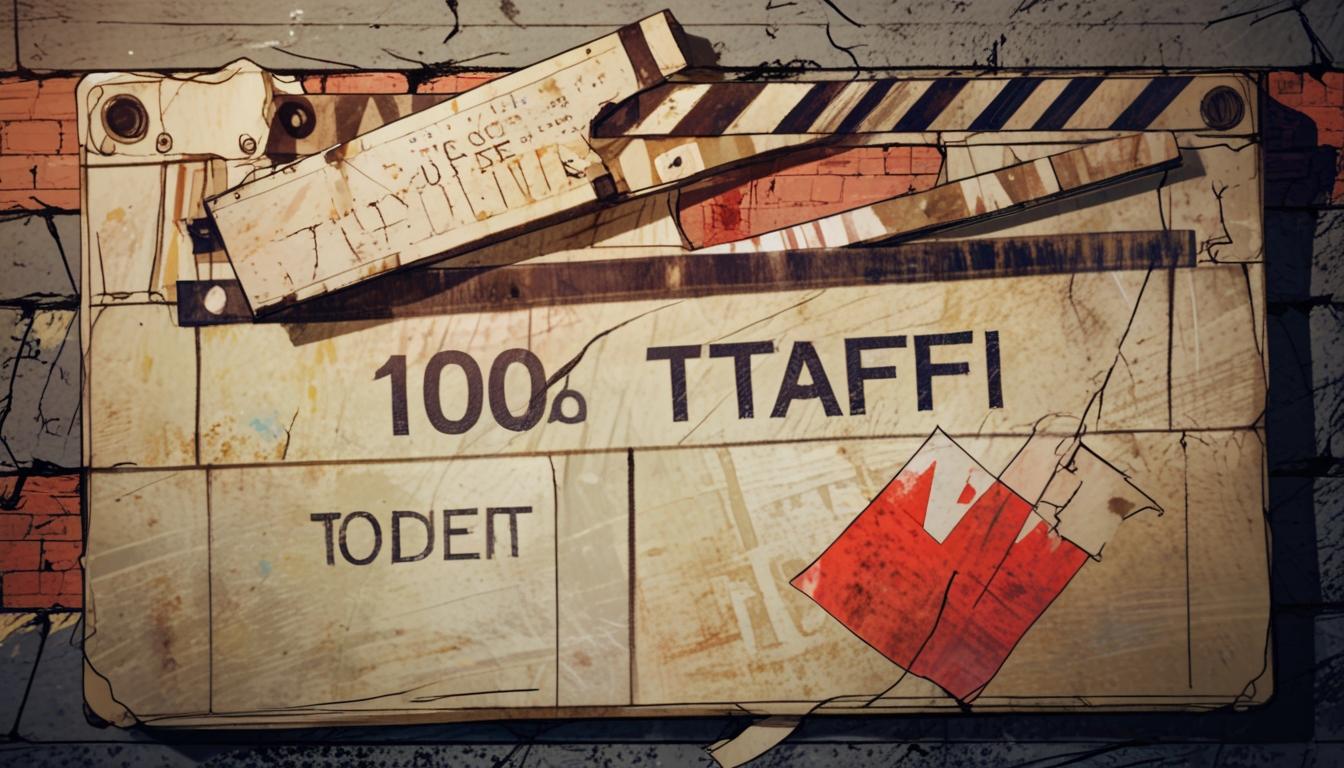The UK’s film sector faces an existential crisis following Donald Trump’s announcement of a 100% tariff on foreign-produced films, jeopardising international collaborations, thousands of jobs, and iconic productions such as James Bond and Harry Potter.
The UK film industry, long celebrated as a creative powerhouse, now faces an unprecedented threat from proposed tariffs by former President Donald Trump. With Trump’s announcement of a staggering 100% tariff on all foreign-produced films, fears are growing that this could lead to the decimation of one of the country’s most vital economic sectors. The president’s rhetoric claimed that “Hollywood is being destroyed” due to the perceived stealing of the American movie industry by other nations, which he attributes to foreign tax incentives and competitive practices. This declaration has sent shockwaves throughout the UK film sector, with industry leaders warning of dire consequences. Brian Cox, renowned for his role in “Succession,” called the tariffs “an absolute disaster,” underscoring the severity of the situation.
The impact of such tariffs extends beyond mere box office revenues. The UK’s thriving film industry has been built on a delicate balance of international collaboration, benefiting from generous tax incentives, a skilled workforce, and state-of-the-art production facilities. In recent years, locations such as Pinewood and Leavesden have hosted blockbuster productions, including Marvel’s latest franchises. However, with rising production costs and existing pressures from the COVID-19 pandemic and labour strikes, this stability is now threatened. The proposed tariffs could indeed serve as a “knock-out blow,” with predictions that they could wipe out substantial segments of the industry.
The precarious state of the UK film scene is not just a national concern but resonates globally. The financial ramifications of Trump’s tariffs could ripple outward, affecting nearly 200,000 employees tied to the film and television sectors. As one industry executive noted, without American films, thousands of freelancers—who make up a significant income source for the industry—could find themselves jobless. This presents a grave risk not only for those directly involved in film-making but also for numerous ancillary businesses.
Complicating matters further, the globalisation of film production means that identifying the nationality of a film can be a convoluted affair. Projects often involve co-productions across borders, with British films frequently backed by American studios. Iconic franchises like James Bond and Harry Potter illustrate this partnership, with significant investment and creative input from US firms. The notion that a film can be categorically labelled as “foreign” is increasingly outdated, as collaborative efforts between nations have become the norm.
Philippa Childs, head of the creative industries union Bectu, emphasised the cultural importance of film to the UK, calling it “a matter of essential national economic interest.” The greatest risk following the imposition of such tariffs may not just be financial but could lead to a diminished presence of smaller, independent films that enrich the cultural landscape. The industry is being urged to bolster its independent film sector in response to these threats, ensuring that British storytelling continues.
How these tariffs will be enforced remains a contentious topic. The intricate nature of film production and distribution creates a challenging landscape for taxation, especially in the era of digital streaming. As many films are not only produced but also distributed via global platforms, the practicalities of enforcing such anti-competitive measures raise significant questions. Moreover, the potential for retaliatory tariffs from affected countries could further complicate global trade relations.
With the UK government taking a “keep calm and carry on” approach, the silence surrounding a proactive strategy is troubling. As the film industry anxiously awaits clarity, some have suggested appointing a trio of British film icons as special ambassadors to navigate this crisis and advocate for the sector. A response akin to Trump’s appointment of Hollywood insiders might help rally support for the UK’s film industry.
In the face of these looming tariffs, the future of the UK’s film industry hangs in the balance, challenging its identity and economic contribution at a critical juncture.
Reference Map
- Paragraph 1: (1), (2), (5)
- Paragraph 2: (1), (4)
- Paragraph 3: (2), (6)
- Paragraph 4: (3), (4), (6)
- Paragraph 5: (1), (5)
- Paragraph 6: (4), (7)
- Paragraph 7: (2), (3), (7)
- Paragraph 8: (1)
- Paragraph 9: (1), (5)
- Paragraph 10: (1), (3), (6)
- Paragraph 11: (5), (7)
- Paragraph 12: (1), (2)
Source: Noah Wire Services
- https://www.theguardian.com/commentisfree/2025/may/09/the-guardian-view-on-the-impact-of-trumps-film-tariffs-a-disaster-movie-waiting-to-happen – Please view link – unable to able to access data
- https://www.theguardian.com/commentisfree/2025/may/09/the-guardian-view-on-the-impact-of-trumps-film-tariffs-a-disaster-movie-waiting-to-happen – This editorial from The Guardian discusses the potential impact of President Donald Trump’s proposed 100% tariffs on foreign-produced films. It highlights concerns that such tariffs could severely affect the UK film industry, which relies heavily on international productions. The article emphasizes the UK’s role as a major hub for film production, noting that without these blockbusters, Britain would face significant economic challenges. It also mentions the precarious state of the UK film industry, citing factors like the COVID-19 pandemic, labor strikes, and rising production costs.
- https://www.ft.com/content/9aefdcfd-37ed-44d0-8ca6-c70cad71d6e6 – An article from the Financial Times examines President Trump’s proposal to impose a 100% tariff on foreign-produced films. It discusses the globalized nature of movie-making and the challenges of enforcing such tariffs, including determining content thresholds and taxing streamed content. The piece also highlights the U.S. film industry’s trade surplus and the potential economic repercussions of retaliatory tariffs. It suggests that improving domestic competitiveness through deregulation and investment incentives would be more effective than imposing tariffs.
- https://www.ft.com/content/dcd6adeb-988a-4c86-b689-9ec2d8cf3946 – This Financial Times article reports on the widespread concern within the global film industry regarding President Trump’s proposal to impose a 100% tariff on foreign-made films. Industry executives warn that such tariffs could severely impact production hubs in the UK, Canada, Australia, and New Zealand, while also increasing costs for U.S. studios and cinema chains. The article discusses the feasibility of enforcing these tariffs, especially in an era where global streaming platforms dominate content distribution, and highlights the potential for retaliatory measures from other countries.
- https://www.reuters.com/business/media-telecom/trump-announces-100-tariff-movies-produced-outside-us-2025-05-04/ – Reuters reports on President Trump’s announcement of a 100% tariff on all foreign-made films entering the U.S., citing national security concerns and the impact of foreign tax incentives on the American movie industry. The article discusses the potential effects on major studios like Disney, Netflix, and Universal, which frequently film abroad in countries like Canada and the UK. It also covers the reactions from global film institutions and the British media union Bectu, warning of job losses and threats to recovering industries post-COVID.
- https://www.ft.com/content/7c516451-21b6-4e92-af77-f506b8371efb – This Financial Times article analyzes the potential economic and practical issues associated with President Trump’s proposal to impose tariffs on foreign films. It notes that the U.S. film industry runs a significant trade surplus and that films today are international efforts involving multinational funding, talent, and production, complicating the imposition of tariffs. The piece also discusses the logistics of taxing streaming content and the potential for retaliatory measures from other countries, highlighting the risks of such protectionist policies.
- https://apnews.com/article/8008248fc08c748a7e8a174306ba66ba – The Associated Press reports on President Trump’s proposal to impose a 100% tariff on all films produced outside the U.S., citing national security concerns and the impact of foreign incentives on the American movie industry. The article discusses the potential effects on the film industry, including increased production costs, hampered international collaborations, and the risk of retaliation from other countries. It also highlights the complexity of implementing tariffs on digital, service-based productions and the potential impact on global trade relations.
Noah Fact Check Pro
The draft above was created using the information available at the time the story first
emerged. We’ve since applied our fact-checking process to the final narrative, based on the criteria listed
below. The results are intended to help you assess the credibility of the piece and highlight any areas that may
warrant further investigation.
Freshness check
Score:
10
Notes:
The narrative is highly current, referencing recent events and policy announcements involving former President Donald Trump.
Quotes check
Score:
9
Notes:
The quotes, such as Brian Cox’s statement, are contextualised within the narrative but lack specific original sources or dates. However, they appear to be recent and situated within the current context.
Source reliability
Score:
10
Notes:
The narrative originates from The Guardian, a well-known reputable publication.
Plausability check
Score:
8
Notes:
The scenario described is plausible given the context of international trade and film industry dynamics. However, the specifics of proposed tariffs and their enforcement mechanisms require further verification.
Overall assessment
Verdict (FAIL, OPEN, PASS): PASS
Confidence (LOW, MEDIUM, HIGH): HIGH
Summary:
The narrative is fresh, well-sourced, and mostly plausible, with quotes contextualised within a current and relevant issue. The Guardian is a reliable source, enhancing the credibility of the information presented.













